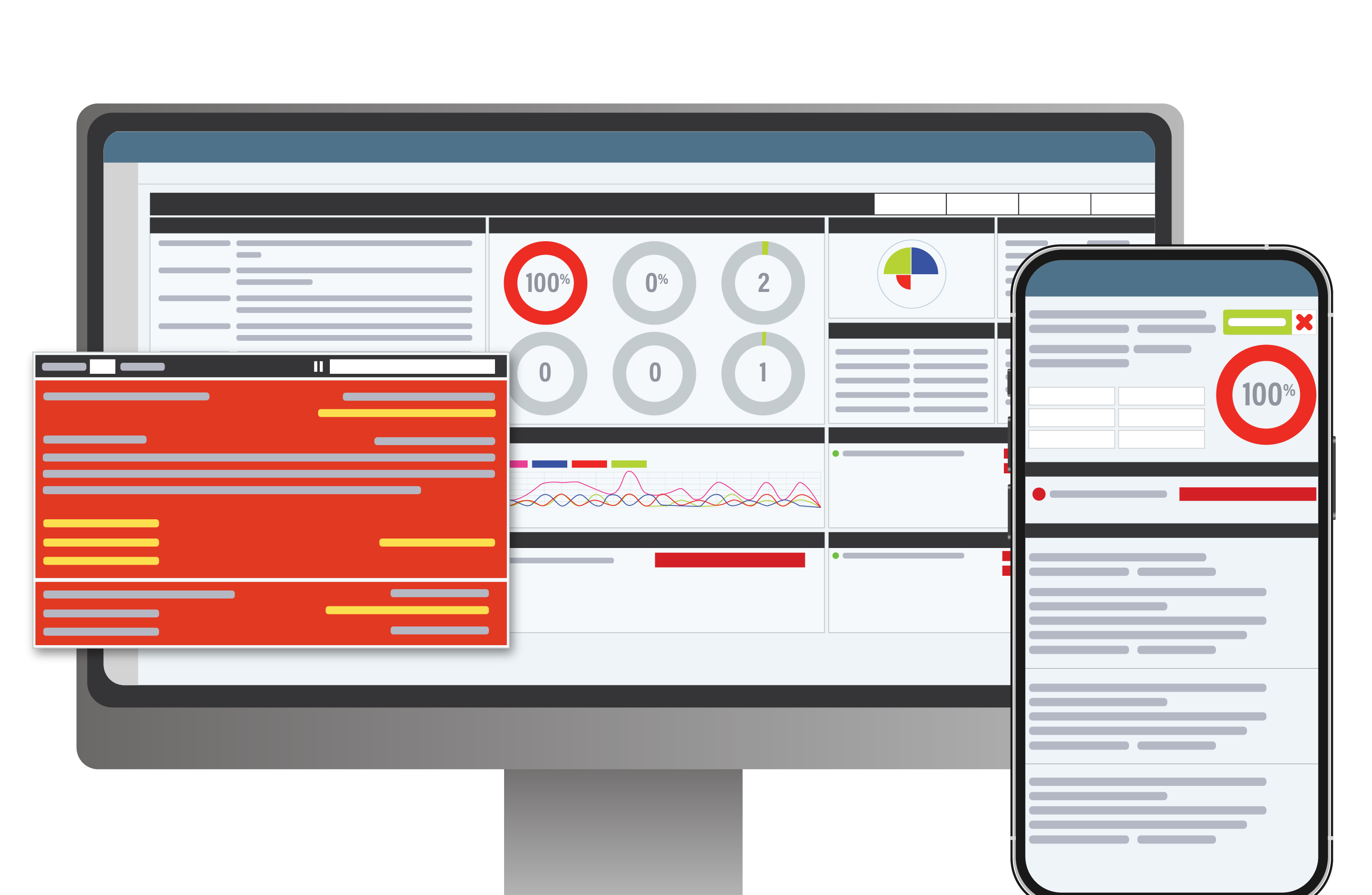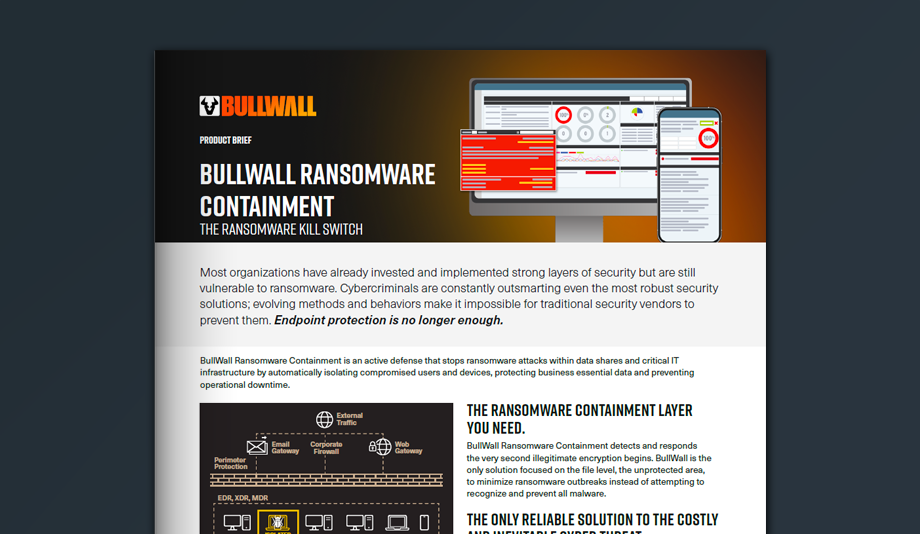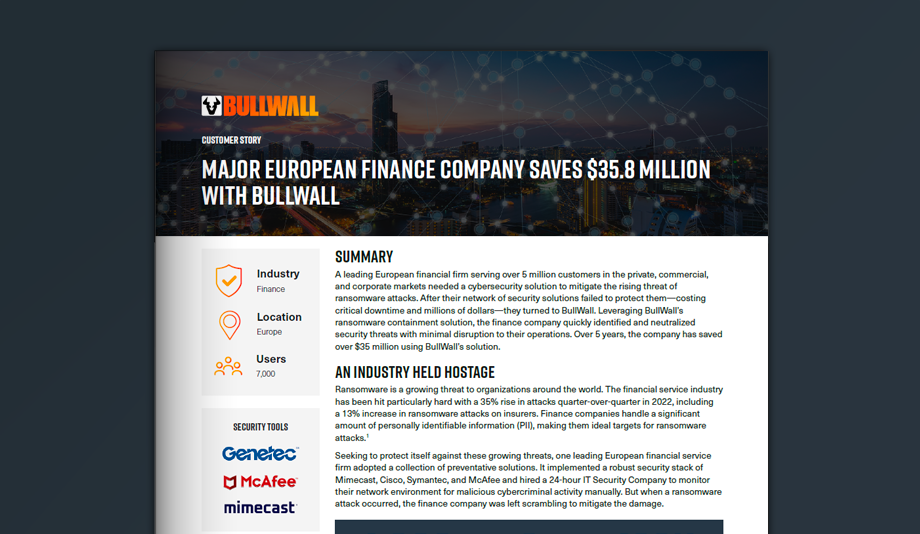What is Ransomware Containment?
Ransomware containment is an active defense solution designed to detect, isolate, and halt active ransomware attacks. It protects critical IT infrastructure with real-time data monitoring, detection & self-activated isolation and automated compliance reporting. Seen by many as a last line of defense, BullWall’s innovative ransomware containment solution detects and stops active ransomware on file shares and servers, both on-premises and in the cloud, by isolating compromised users and devices. This laser-focused ransomware containment solution secures critical data, designed to keep hackers from propagating malicious encryption and exfiltration.
More Ransomware Containment FAQs+
How Does Ransomware Containment Work? +
A ransomware containment solution monitors data activity across various systems such as SAN/NAS file shares, VMs, domain controllers, database servers and application servers, on-prem and in the cloud, in real time. The ransomware containment platform developed by BullWall leverages dozens of detection sensors and machine-learning capabilities to instantly detect illegitimate encryption and exfiltration.
When compromised users or devices initiate abnormal encryption, our ransomware containment solution automatically activates an isolation and containment protocol. This prevents further damage by quarantining the affected components.
In order to quickly stop malicious encryption, our ransomware containment solution deploys built-in PowerShell scripts that halt file encryption and data exfiltration within seconds. By doing so, your essential business data is protected, operational downtime is prevented, and extortion attempts are blocked.
Who Needs a Ransomware Containment Solution? +
Ransomware is a global threat, and proactive containment measures are essential to safeguard against the negative effects of a potential server infiltration. An over reliance on EDRs to prevent ransomware, coupled with the continued growth of successful ransomware attacks, has resulted in the crucial need for active attack containment.
BullWall Ransomware Containment is trusted by over 1000 organizations in over twenty countries, spanning Healthcare, Education and critical infrastructure. BullWall has also helped countless organizations qualify for cyber insurance (all interlinks) coverage, often at a discounted rate.
What are the Differences Between EDR and Ransomware Containment? +
Endpoint Detection and Response (EDR) plays a crucial role in safeguarding organizations against ransomware attacks that initiate on the endpoint. However, these solutions are based on behavioral detection capabilities, employing artificial intelligence (AI) to recognize and block threats which limits their ability to protect against attacks such as zero-day exploits BullWall Ransomware Containment takes an entirely different and innovative approach. Instead of protecting endpoints, BullWall protects what the ransomware hacker is after - the data.
Our ransomware containment solution resides on the server, not the endpoint, and does not require an agent. Also, instead of trying to identify ransomware, it detects and responds to the behaviors indicative of a ransomware attack, such as illegitimate file encryption and data exfiltration.
Is a Ransomware Containment Solution Easy to install? +
Installing BullWall Ransomware Containment is a fairly lightweight exercise in part because it is not installed on endpoints, nor does it require an agent. Our agentless solution is easily deployed within days on a virtual machine, and leverages machine learning to configure itself automatically.
Our solution requires only read access to data and creates no network performance overhead.
BullWall Ransomware Containment works seamlessly with on-prem and cloud-based repositories such as Office 365, SharePoint and Google Drive. Our solution is OS-agnostic to the device type accessing the cloud, including mobile devices, tablets, MAC, IoT and laptops. It is also compatible with OS independent environments, such as Windows, Android, IOS and Linux. It also offers comprehensive monitoring and protection for physical infrastructure components, including data servers, virtual machines, application databases, and domain controllers.
While many ransomware attacks enter an organization through phishing emails or remote desktop protocol, infiltrations can also originate from misconfigured cloud instances, a remote attack on a server, 3rd party contractors, or even USB and other removable media devices. Regardless of the entry point, our ransomware containment tool was developed to act immediately when indicators of compromise are evident. It responds by isolating and containing the compromised device and user, instantly halting the active attack.
Is BullWall Ransomware Containment Automated? +
Yes, once BullWall Ransomware Containment has been set up, it runs automatically and you don’t have to worry about monitoring it for incidents. The 24x7 automated detection and response will keep your organization protected at all times.
Is Reporting Built-in? +
In addition to stopping malicious encryption, it is also essential to recover and report the details of what happened and what areas of the organization were impacted as quickly as possible. BullWall Ransomware Containment quickly identifies any encrypted files that can be restored from backup, and the fully automated compliance incident reporting with advanced history log captures all attack details for internal leadership and external government agencies. Our ransomware containment tool provides automated compliance reporting suitable for standards such as GDPR and NIST.
What Other Technologies can our Solutions Integrate with? +
BullWall integrates with your existing security stack (ITAM, SIEM, EDR, NAC) via RESTful Web APIs and works in parallel with vendors such as Carbon Black, CrowdStrike, McAfee, Symantec, Sentinel One, Sophos and many more. Our integrations provide an additional layer of protection and strengthens the value of existing cyber security layers. Our ransomware containment & server intrusion protection services(interlink) are fully scalable from small businesses to large global enterprises. It does not matter the size of the IT infrastructure or the type of file applications used, our ransomware containment and mitigation solutions can benefit your business.



